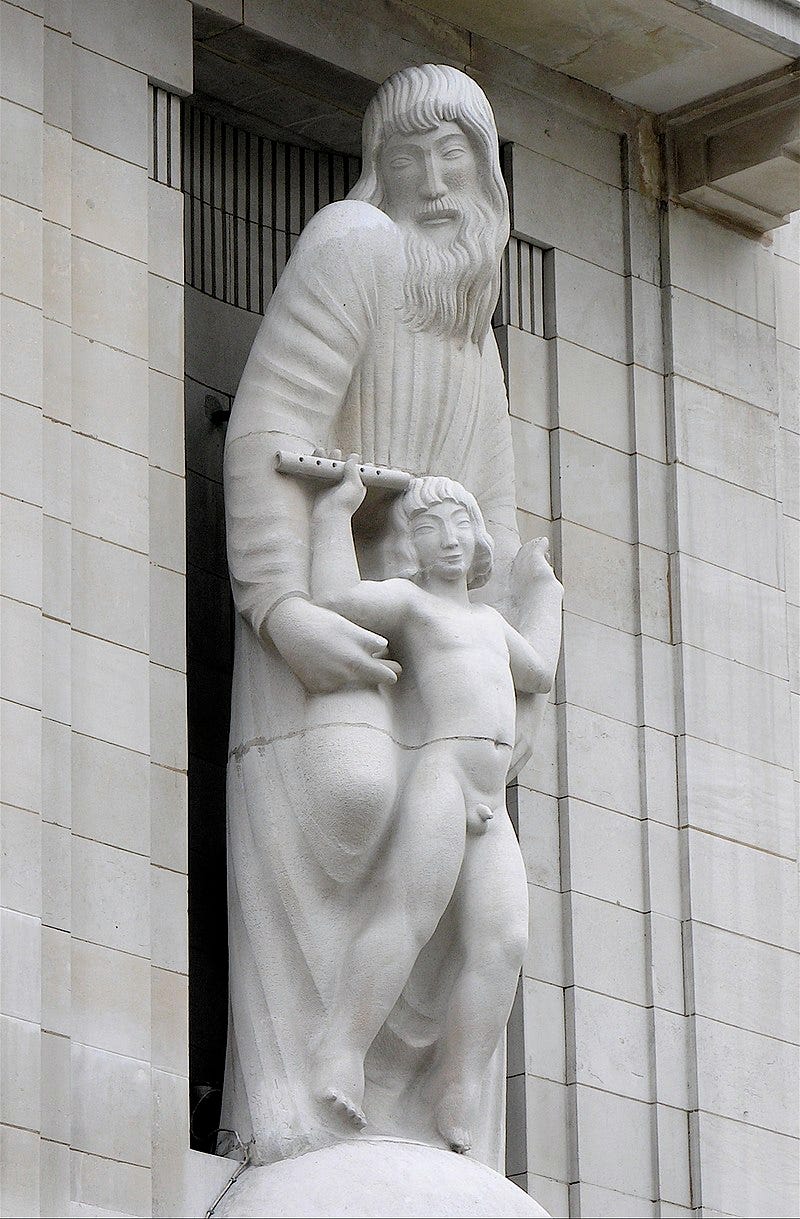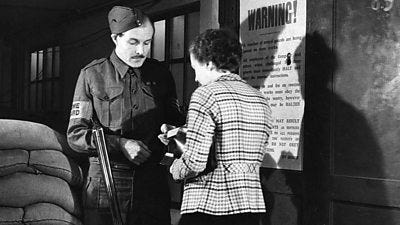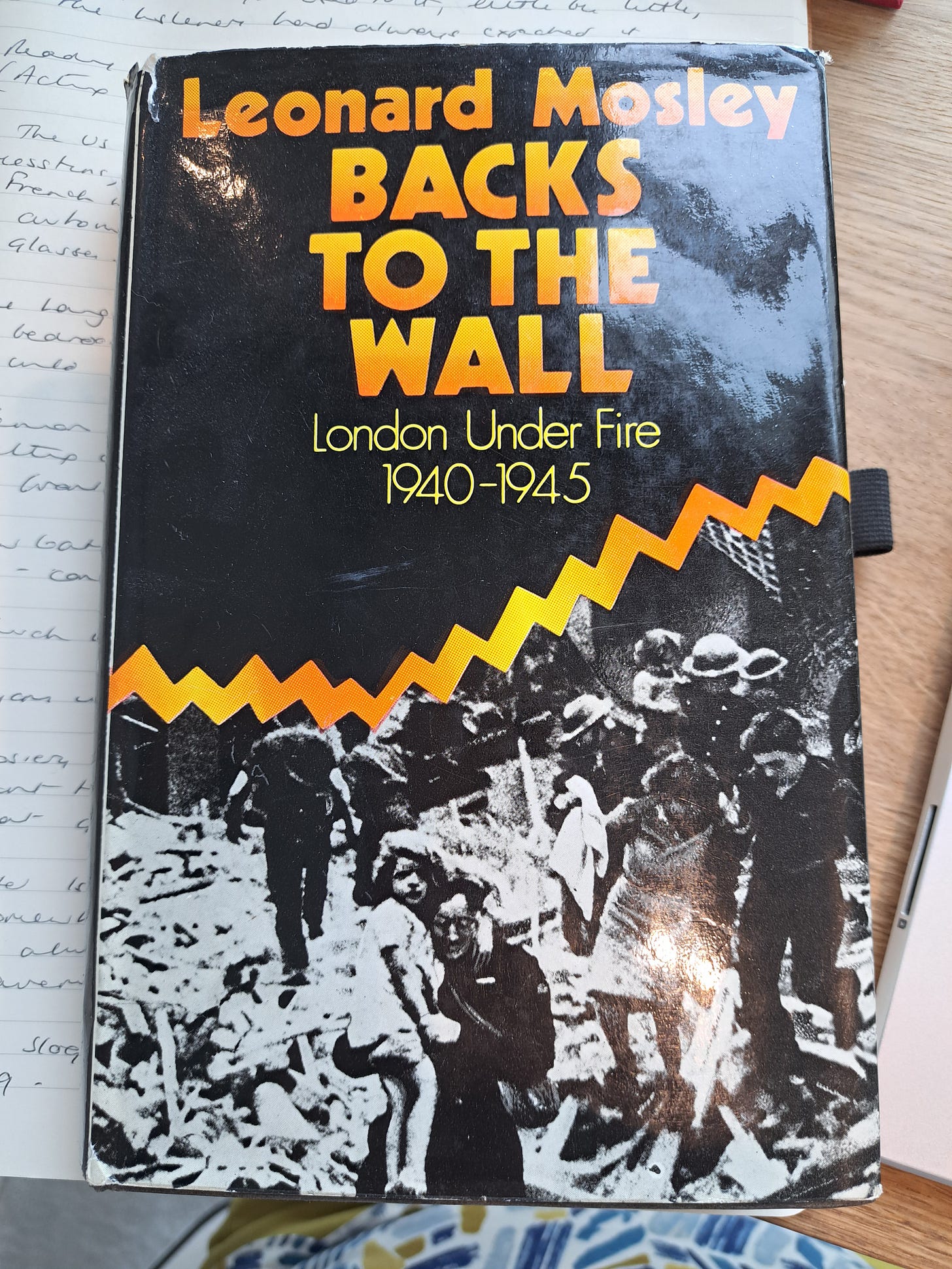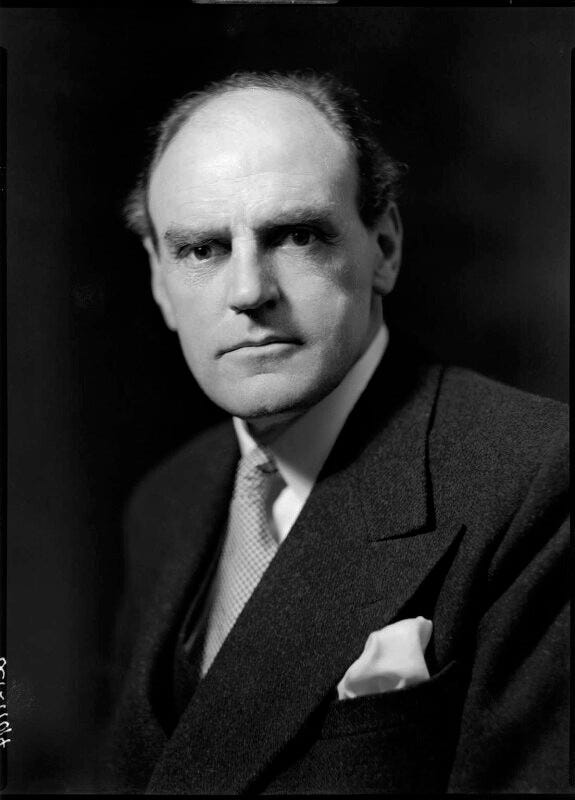Human Voices
Truth and other casualties of war
In 1928, the British Broadcasting Corporation began the construction of a new headquarters building, Broadcasting House, in Langham Place on Upper Regent Street. The first programme to be broadcast was on the evening of 15 March 1932, a programme of music from the BBC Dance Orchestra, led by conductor and composer Henry Hall. It seemed to suggest that this magnificent building would be the source of the best in cultural entertainment for the British people for years to come. It is to this day an imposing structure, now greatly modernised and extended, but originally it comprised a carefully engineered interior brick shell which housed twenty-two sound-proofed radio studios, its outer corridors surrounded by window-lit offices, the whole faced with Portland Stone, and with (controversial) exterior decoration by the sculptor Eric Gill. However, when war broke out in 1939, this building would mutate into a crucial block in the defence of the realm, and the highly-charged atmosphere within, where George Orwell and Louis MacNeice rubbed shoulders with announcers and engineers, is beautifully described by someone who worked there at the time, the author Penelope Fitzgerald, in her 1980 novel Human Voices.

The gossip of the seven decks increased the resemblance of the great building to a liner, which the designers had always intended. Broadcasting House stood on a fixed course south. With the best engineers in the world, and a crew varying between the intensely respectable and the barely sane, it looked ready to scorn any disaster of less than Titanic scale.
Human Voices is not much more than a novella, concentrating on the summer months between the fall of France in June 1940 and the start of the Blitz. By this time, the BBC Drama, Variety and Music departments had been evacuated to other parts of the country, leaving Broadcasting House (‘BH’) for news, talks and public information announcements. Fitzgerald plunges you into the action from page one, making you feel that you are the newly-recruited junior clerk , trying to make sense of the confusing layers of bureaucracy and the bosses known only by their acronyms (‘the ADDG’, which I eventually decoded as the Acting Deputy Director General; the DPP, Director of Programme Planning; the RPD or Recorded Programmes Director). And there is the typically British, embedded class structure to navigate as well: the new bathrooms on the fifth floor are only for the use of Assistant Controllers and above. The Langham Hotel across the road has been commandeered for the duration and provides office space but also bedrooms for the senior men… as the bombs start to fall and all-night working becomes the norm, the deserted concert hall in BH is given over to bunk beds for staff, with grey blankets hung on a rope to segregate the sexes…would there be ‘goings on? Surely not while England’s in danger…’ Reluctantly the canteen has been granted a liquor licence, although it is hoped that staff about to go on duty will limit themselves to no more than two drinks. Of course, the bar at the Langham is available for senior staff.
Television, only just getting going and watched by very few, was taken off the air in September 1939; Alexandra Palace was closed down. It was thought that the airwaves could have been used to guide in German bombers. Similarly, there were no weather forecasts transmitted until after VE Day in 1945, as the British had a deal with the Irish Government which gave them better information about incoming weather fronts than the Germans could access. But the radio service was absolutely crucial to British morale: a Mass Observation Survey in 1940 revealed that everyone in London with access to a radio was listening to the BBC News at least twice, and sometimes as often as five or six times a day. There were six broadcasts daily, the 9pm broadcast perhaps being the most popular.
As I am currently researching the lives of young women in Britain during the 1930s, there is much in this novel to fascinate and store away. Snippets of life in the Blitz: The Lyons cafe in Piccadilly serving cold baked potatoes to office workers because of the bread shortages, very filling. The woman selling hosiery, who does not ask if you want plain knit or micromesh stockings, but ‘do you want the kind that ladders, or the kind that goes into holes.’ The vision of senior staffers attending a compulsory first aid course, unused to sitting on a chair without a conference table in front of them. The arrival from fallen France of an American reporter, fresh off a Breton fishing boat, who marches into the DPP’s office laden with ‘tin hats, webbing belts, mess tins, three cameras, a Press armband, a bedroll, French wines, French cheeses, a holster, a .45 automatic and a pair of officer’s field glasses.’ And a large sack of oranges.
As the Blitz begins, the tension rises. Churchill’s belligerent, if macabre slogan ‘You can always take one with you’, addressed to the home population arming themselves against the invaders, was on everyone’s lips. On 7 September the producers received an ‘invasion imminent’ warning, a sign that they should be ready with recordings of church bells to be played across the airwaves…but only the bombers arrived. ‘After the first week of September, London became every morning a somewhat stranger place. The early morning sound was always of glass being scraped off the pavement.’.
Broadcasting House was not immune from the bombing. On 15 October 1940 a bomb fell inside the building, killing six people. The only interruption in the news broadcast, so the legend goes, was a slight pause while the newsreader blew the dust off his script. On 8 December 1940 a parachute bomb fell into Langham Place, an incident used by Fitzgerald in the novel. In the archives of the BBC there is a survivor’s recording
My head was up watching and before I could lie down flat the thing exploded. I had a momentary glimpse of a large ball of blinding, wild, white light and two concentric rings of colour, the inner one lavender and the outer one violet, as I ducked my head…the explosion made an indescribable noise - something like a colossal growl - and was accompanied by a veritable tornado of air blast…
I have taken this from a fascinating book, Backs to the Wall: London under Fire 1940-45, by Leonard Mosley, packed with eyewitness testimony, much of it from the Mass Observation records.
The first casualty when war comes is truth, said Senator Hiram W Johnson in 1918. Every country, every Government, deals differently with the need to control information or produce propaganda. But the BBC, under the stewardship of the redoubtable and determined Lord Reith, stuck to its own course.
As Fitzgerald wrote:
Broadcasting House was in fact dedicated to the strangest project of the war, or of any war, that is of telling the truth. Without prompting, the BBC had decided that truth was more important than consolation, and in the long run would be more effective. And yet there was no guarantee of this. Truth ensures trust, but not victory, or even happiness. But the BBC had clung tenaciously to its first notion droning quietly on, from dawn to midnight, telling, as far as possible, exactly what happened. An idea so unfamiliar was bound to upset many of the other authorities, but they had got used to it, little by little, and the listeners had always expected it.
In our current world of misinformation, of rumour amplified by social media, of terror on the streets driven by the lies of evil people, it seems an unlikely project, a survivor from an earlier world, a simpler time. To read Fitzgerald’s novel is to be reminded of those times, when all that mattered was that the people should be told the truth.






Brilliant piece, makes me want to read the novel.
A wonderful essay, thank you Sarah!